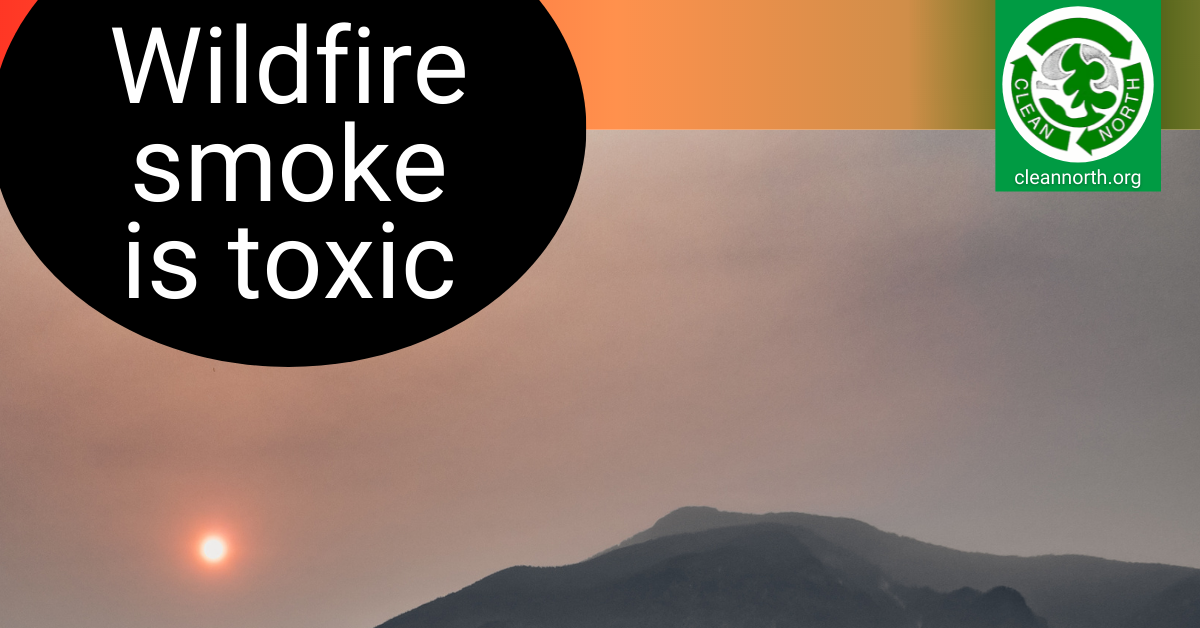
Smoke from wildfires is toxic air pollution. So when our area is affected, heed warnings and take steps to limit exposure. Doing so is especially important here in Sault Ste. Marie because we are already regularly exposed to air pollution from heavy industry.
The wildfire smoke problem in Canada is not going away any time soon. In fact, it will likely get worse as climate change unfolds. Canadian Forest Service forest fire researcher Mike Flannigan has noted that “in a word, the future [of Canada] is ‘smoky.'”
It’s important for us to hold our elected leaders at all levels, as well as the private sector, accountable for their lack of action on stopping climate change. Because of mass leadership failure, ordinary citizens are now paying a heavy price including health effects from wildfire smoke.
How is wildfire smoke harmful?
Wildfire smoke contains a stew of toxic chemicals such as carbon monoxide as well as particulates. These pollutants can affect your health. For most of them, there is no safe exposure level — they can be harmful even at low levels.
Air quality can be seriously compromised with health effects even when you can’t see or smell any smoke.
How can I tell if smoke exposure is affecting me?
Mild symptoms: headaches, cough, runny nose, phlegm, and irritated eyes, nose, and/or throat.
More serious symptoms: dizziness, chest pain, severe cough, shortness of breath, wheezing, and irregular heartbeat. If you develop any serious symptoms, seek immediate medical attention.
Wildfire smoke alerts can also contribute to mental health issues like anxiety and depression.
Who is most at risk?
Those at higher risk of health issues if exposed to wildlife smoke include:
- People with chronic health conditions (asthma, emphysema, cancer, diabetes, etc.)
- Older people
- Pregnant people
- Babies and young children
- People who work or exercise outdoors
FYI: People not on this list are not immune to the effects of wildfire smoke and should still take precautions.
How can you protect yourself and your family?
The most important thing we can do as ordinary citizens is demand that our elected leaders at all levels take immediate and meaningful action on climate change. We can also “vote” on what the private sector does by choosing to buy from companies with sustainable businesses practices and avoiding those that don’t (one resource is CDP).
But in the meantime, during a wildfire smoke warning…
- Stay inside as much as possible with windows and doors closed
- Use the recirculation setting on your heating/cooling system
- Use a clean, high-quality HEPA filter in your ventilation system
- Use a HEPA air purifier to remove smoke from your home
- Drink lots of water
- Avoid strenuous outdoor exercise and don’t go camping or to the beach
- Keep your car windows closed and set the ventilation system to recirculate
- Avoid other sources of smoke (from campfires, cigarettes, candles, incense, etc.)
We recognize that some people have no choice but to go outside. For example, people without cars must wait outside for buses to come, and construction workers have no choice but to work outside. Those without air conditioning may have no choice but to leave windows open to avoid heat stress. If you are in one of these groups, focus on those things you do have control over…and we encourage you to share the challenges you face with elected officials at all levels of government.
FYI: Cloth/medical masks worn to help prevent getting infected with covid do not protect you against wildfire smoke.
Want to know more, including more steps to take to protect you and your family? Visit the Government of Canada’s page on wildfire smoke and health.




